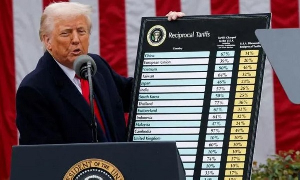The true face of Corruption in Ghana is not just a political issue but a deeply individualistic lived reality of Ghanaians; It is the bribe that facilitates expired and fake pain medication used during C-sections in hospitals. It is the bribe that led to the killing of loved ones in an accident.
It is the bribe that caused the imprisonment of the innocent citizen while freeing the criminal in the trial. It is the bribe that led to feeding the nation with expired food product.
It is the bribe that denies the bright citizen that job opportunity, that contract, that opening in life. It is that bribe that caused serious social unrest setting community against community on war path. Indeed, it is that bribe that is eating away every decency in our lives and multiplying our hardship exponentially.
It is that bribe that is vastly widening the social political and economic inequality in our beloved nation. Overwhelming as it might seem, Singapore has shown that corruption is not an incurable sickness because can be stopped with deliberately sustained efforts.
Recent reports paint a troubling picture. Ghana’s 2023 Corruption Perceptions Index (CPI) by Transparency International scored 43 out of 100, signalling a persistent struggle. Public sector bribery remains rampant, with a 2022 survey revealing that nearly a third of Ghanaians had paid a bribe in the past year. In monetary terms, the Ghana Integrity Initiative estimates that over $3 billion is lost annually to corruption-related inefficiencies.
High-profile corruption cases—such as the scandal involving the Ghanaian procurement sector and allegations against senior officials—highlight systemic weaknesses in accountability and law enforcement. Ghana's Auditor-General reported in 2021 that over GH₵12 billion in public funds were lost due to financial irregularities, further exacerbating the problem.
Notwithstanding these challenges, there is hope. Singapore, once riddled with corruption in the 1950s and 60s, transformed into one of the world’s least corrupt countries. Its journey offers invaluable lessons for Ghana, particularly in three key areas: Political will, Institutional strength, and Cultural transformation.
Notwithstanding these challenges, there is hope. Singapore, once riddled with corruption in the 1950s and 60s, transformed into one of the world’s least corrupt countries. Its journey offers invaluable lessons for Ghana, particularly in three key areas: Political will, Institutional strength, and Cultural transformation.
Ghanaian leaders must demonstrate a firm commitment to fighting corruption by prosecuting corrupt officials, regardless of political affiliation, fully enforcing anti-corruption laws, and safeguarding institutions like the Office of the Special Prosecutor from political interference. Without genuine political will, anti-corruption measures remain superficial.
In Singapore, Lee Kuan Yew’s administration aggressively pursued corrupt officials, ensuring that no one was above the law. The government can take inspiration from this approach by ensuring that high-profile corruption cases are resolved transparently and fairly, thus restoring public confidence in the justice system.
Institutional strengthening is crucial. The Commission on Human Rights and Administrative Justice (CHRAJ) and the Office of the Special Prosecutor (OSP) must be well-funded, truly independent, and equipped with modern investigative tools, including digital tracking of public procurement and asset declarations for public officials.
The introduction of electronic procurement systems, like Singapore’s GeBIZ, can significantly reduce human discretion in public contract awards, curbing opportunities for bribery.
Institutional strengthening is crucial. The Commission on Human Rights and Administrative Justice (CHRAJ) and the Office of the Special Prosecutor (OSP) must be well-funded, truly independent, and equipped with modern investigative tools, including digital tracking of public procurement and asset declarations for public officials. The introduction of electronic procurement systems, like Singapore’s GeBIZ, can significantly reduce human discretion in public contract awards, curbing opportunities for bribery.
Digitalizing public services, including land registration and tax filing, can also minimise opportunities for petty corruption. Studies have shown that automation in government services reduces bribery by up to 40% in some cases. Ghana must move beyond digitisation sloganeering and implement robust practical efforts to link and expand the functionality of the Ghana Card to enable the reduction of bureaucratic bottlenecks that incentivise bribeseeking behaviours.
Whistleblower Act, act 2006 (act 720) has not succeeded in gaining public validity because its protection remains weak in Ghana thereby discouraging individuals from exposing corruption. A 2021 Afrobarometer survey found that 72% of Ghanaians feared retaliation for reporting corrupt activities. Strengthening legal protections and providing incentives for whistleblowers can encourage more citizens to report corruption without fear.
Singapore’s system, which guarantees confidentiality and rewards whistleblowers, has led to a high conviction rate for corruption cases. Implementing similar frameworks in Ghana could increase transparency and accountability. Imagine the impact of giving 1% of recovered corrupt wealth to the whistleblower.
Public sector appointments should be based on merit whether the appointee is political or not. A 2019 report by the Centre for Democratic Development (CDD-Ghana) found that 65% of senior public sector appointments were influenced by political connections rather than competency.
This fosters inefficiency and creates a cycle where corruption becomes an accepted norm. Our nation must implement transparent recruitment practices and performance-based promotions to reduce patronage networks that fuel corruption across all sectors.
Public accountability mechanisms can also play a vital role. Community scorecards for government projects hand the audit authority to the citizens who are beneficiaries of projects, and access to information laws must be actively enforced. The experience of Rwanda, a nation ravaged by conflict for over a decade has made significant anti-corruption strides, demonstrating that citizen engagement in governance enhances oversight and discourages corrupt practices.
At its core, corruption is a human problem driven by fear, greed, and a lack of trust in the system. But it can be countered by fostering a culture of accountability, fairness, and hope. If ordinary Ghanaians see that corrupt leaders are held accountable, they will begin to trust the system again. If they believe that honesty leads to opportunity, they will choose integrity over bribery. And if leaders show that real change is possible, the cycle of cynicism can be broken with a secured future where transparency and fairness reign supreme.
Opinions of Friday, 28 March 2025
Columnist: Issaka Sannie (Farakhan)















